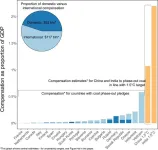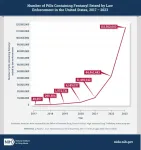(Press-News.org) Civilized political debates may seem increasingly out of reach as democracies across the world face rising polarization, but people still want to discuss issues with people they disagree with – especially those who present themselves as balanced and willing to seek solutions that work for everyone or open to learning new information, according to two studies published by the American Psychological Association.
One study, published in the Journal of Experimental Psychology: General, examined how U.S. politicians and ordinary Americans with opposing political beliefs could share their ideas on divisive issues in a way that improved respect regardless of political party.
While reviewing a video series featuring real-world politicians solving political dilemmas designed to help voters evaluate the thoughtfulness of political candidates, researchers realized that the videos made viewers from the opposing party more open to learning about the politicians’ platform. They found this was because the videos made the politicians look balanced and pragmatic, two key characteristics of wise decision makers.
“It’s easy for us to think about members of both parties as being completely biased in favor of their side. But what happens so much of the time is that people talk past each other or show more interest in pointing out the ridiculous things the other side is doing rather than actually finding solutions,” said co-author Curtis Puryear, PhD, a post-doctoral researcher in the Kellogg School of Management at Northwestern University. “Our findings suggest that if you show you care about understanding the other side’s concerns, it goes a long way towards fostering respect.”
Puryear and co-author Kurt Gray, PhD, of the University of North Carolina at Chapel Hill, conducted eight experiments with more than 3,500 participants to test the effectiveness of political messages that relied on balanced pragmatism, an approach to conflict that focuses on showing concern for both sides’ interests while prioritizing practical solutions.
In one experiment, 505 Americans from different political parties evaluated a series of posts on the social media platform X by members of the U.S. House of Representatives. From a sample of more than 50,000 posts made by the representatives’ official accounts, the researchers selected 120 posts that discussed political issues without criticizing the opposing party and varied in how balanced and pragmatic each post was.
Each participant evaluated 30 posts, rating them based on how balanced and pragmatic each post seemed, the post’s overall tone, how divisive the post seemed, how much they respected the politician and how interested they would be in hearing more about the politician’s point of view.
The researchers found that posts that combined balance with pragmatism were the most likely to increase participants’ respect for a politician and their willingness to engage with them. Posts in which a politician mainly expressed a desire to find effective solutions improved participants’ respect regardless of party, but this was not as effective at garnering respect compared with politicians who also presented a balanced view of an issue. The benefits of balanced pragmatism for fostering respect were even more pronounced for posts discussing highly divisive issues, like immigration and abortion.
“Logical analyses and strong arguments can make us see someone as competent, which is a trait we value in leaders and friends,” said Puryear. “But people also want leaders who understand their constituents, who care about their concerns, and have the practical knowledge to find solutions. These are the qualities of balanced and pragmatic leaders.”
In another experiment, researchers focused on whether ordinary Americans could also use balanced pragmatism to improve their political conversations. They recruited 211 Democrats in favor of decreasing deportations of undocumented immigrants and 85 Republicans in favor of increasing deportations. The participants were shown four comments written by participants in a previous experiment who argued their position on deportation using either balanced pragmatism or logical reasoning.
Overall, people were just as likely to say they wanted to have a conversation with someone who disagreed with their views on immigration when that person appeared balanced and pragmatic as they were to say they wanted to talk with someone from their own political party.
While it can be difficult for people to present their views on a divisive issue in a way that respects an opposing viewpoint and looks for a common solution, it could help solve the rising political animosity that we are facing, Puryear said.
“Being balanced and pragmatic takes effort,” he said. “But it is like building any other habit: Changing how we approach politics takes commitment and practice. We can each take it upon ourselves to do that.”
Another study, published in the Journal of Personality and Social Psychology, found that people could be willing to discuss controversial topics, such as gender-neutral language, with people who had opposing views when both express intellectual humility.
Intellectual humility is the recognition that your knowledge has limits and your beliefs could be wrong. It does not mean that someone who is intellectually humble is insecure or that they don’t have informed opinions, only that they are willing to acknowledge that they do not know everything.
“Intellectual humility could be an important aspect when trying to understand how to help people engage in these discussions on divisive issues,” said the study’s lead author, Larissa Knöchelmann, MSc, a research fellow and advanced PhD student at Philipps-Universität Marburg. “Political discussions are important for a democratic society. When people have conversations, they can learn about new perspectives, reduce misunderstandings and work together.”
The researchers conducted four experiments with more than 1,600 participants. In one experiment, they asked 451 Germans about their beliefs regarding the COVID-19 vaccine and whether it should be mandatory, a highly polarized debate in Germany when the experiment was conducted. They were then asked to imagine an online meeting with a new neighbor whose views on vaccination were either the same as or contrary to theirs. They also saw a statement from their neighbor that indicated whether controversial discussions were “boring” because the neighbor felt they knew enough about the topic already or “exciting” because it was an opportunity to learn more.
The researchers found that intellectually humble participants had warmer feelings and more positive evaluations toward groups of people with different political opinions.
Additionally, intellectual humility shaped whether participants were willing to interact with others or not. While non-humble participants would rather talk with someone who shared their opinion, intellectually humble participants did not discriminate between those having the same or a contrary opinion. Overall, intellectually humble conversation partners were approached more and avoided less because participants perceived them as more likeable and the respective conversation as more calm, comfortable and open.
“Many German citizens have the impression that open political debates and an exchange of opinions are not possible anymore. This is especially the case when it comes to emotionally charged political topics,” said Knöchelmann. “Our research now shows that intellectual humility can help to make people more willing to engage with others.”
Articles: “Using ‘Balanced Pragmatism’ in Political Discussions Increases Cross-Partisan Respect,” by Curtis Puryear, PhD, Northwestern University, and Kurt Gray, PhD, University of North Carolina at Chapel Hill. Journal of Experimental Psychology: General, published online March 7, 2024.
“Effects of Intellectual Humility in the Context of Affective Polarization: Approaching and Avoiding Others in Controversial Political Discussions,” by Larissa Knöchelmann, MSc, and J. Christopher Cohrs, PhD, University of Marburg: Philipps-Universität Marburg. Journal of Personality and Social Psychology, published online May 13, 2024.
Contacts: Curtis Puryear can be contacted via email at cwpuryear12@gmail.com. Larissa Knöchelmann can be contacted via email at larissa.knoechelmann@uni-marburg.de.
The American Psychological Association, in Washington, D.C., is the largest scientific and professional organization representing psychology in the United States. APA’s membership includes over 157,000 researchers, educators, clinicians, consultants and students. Through its divisions in 54 subfields of psychology and affiliations with 60 state, territorial and Canadian provincial associations, APA works to advance the creation, communication and application of psychological knowledge to benefit society and improve people’s lives.
END
Getting out of the political echo chamber
Psychological research offers strategies for healthy political discussions among people with opposing views
2024-05-13
ELSE PRESS RELEASES FROM THIS DATE:
Alarming rise of electronic vaping use in U.S. adolescents
2024-05-13
Electronic vapor products (EVPs), also known as e-cigarettes or vaping devices, have an allure because of their marketed image as a safer alternative to traditional cigarette smoking and for their variety of appealing flavors.
Yet, they contain many substances beyond nicotine, including propylene glycol, glycerin, flavorings and potentially harmful chemicals such as formaldehyde and metals, which could pose significant health risks such as respiratory disease, cardiovascular disease and cancer. Vaping also is strongly linked with a serious medical condition that damages the lungs due to the vitamin E acetate, an additive used ...
More than half of Americans give to charity at checkout, survey shows
2024-05-13
BINGHAMTON, N.Y. -- 53% of Americans give impulsively to charities at the checkout, and certain demographics tend to give more, according to a new survey conducted by faculty at Binghamton University, State University of New York.
From supermarkets to retail, Americans are used to being asked for donations while making in-person or online purchases – whether by rounding up, donating a set amount or purchasing a token. Industry reports reveal how money is being raised – checkout charity campaigns brought in almost $750 million in 2022, with campaigns through ...
Taking electroretinography to the next level with a soft multi-electrode system
2024-05-13
Eye diseases are becoming more prevalent worldwide, partly because of the aging population, but also because of our greatly increased screen time compared to previous generations. Considering our use of displays will most likely keep rising due to technologies such as virtual and augmented reality, we must improve our diagnostic techniques for the early detection and monitoring of ocular diseases.
Among the arsenal of tools ophthalmologist have at their disposal, electroretinography (ERG) still holds much-untapped potential. Simply put, ERG consists of taking measurements of the electrical ...
New Study: The price tag of phasing-out coal
2024-05-13
Coal phase-out is necessary to solve climate change, but can have negative impacts on workers and local communities dependent on coal for their livelihoods. Researchers at Chalmers University of Technology in Sweden and Central European University in Austria have studied government plans for coal phase-out around the world and discovered that more than half of such plans include monetary compensation to affected parties. This planned compensation globally amounts to USD 200 billion, but it excludes ...
Dramatic increase in fentanyl seized by authorities in last six years
2024-05-13
The number of illicit fentanyl seizures by law enforcement in the United States grew by more than 1,700 percent between 2017 and 2023, according to a new analysis. Further, the share of total fentanyl seizures that involved pills quadrupled over the same period–with the 115.6 million pills seized in 2023 representing 49 percent of total seizures.
This is the first time that such up-to-date seizure data has been published differentiating between fentanyl powder and pills, says the research team led by experts at NYU Grossman School of Medicine and the University of Florida.
Law enforcement drug seizures are used as a proxy for drug availability ...
What makes a memory? It may be related to how hard your brain had to work
2024-05-13
New Haven, Conn. — The human brain filters through a flood of experiences to create specific memories. Why do some of the experiences in this deluge of sensory information become “memorable,” while most are discarded by the brain?
A computational model and behavioral study developed by Yale scientists suggests a new clue to this age-old question, they report in the journal Nature Human Behavior.
“The mind prioritizes remembering things that it is not able to explain very well,” said Ilker Yildirim, an ...
Over 115 million pills containing illicit fentanyl seized by law enforcement in 2023
2024-05-13
Law enforcement seizures of illicit fentanyl increased dramatically in number and size between 2017 to 2023 in the U.S., especially in pill form, according to a new study funded by the National Institutes of Health’s (NIH) National Institute on Drug Abuse (NIDA). The number of individual pills containing fentanyl seized by law enforcement was 2,300 times greater in 2023 compared to 2017, with 115,562,603 pills seized in 2023 vs. 49,657 in 2017. The proportion of fentanyl pill seizures to the total number of fentanyl seizures more than quadrupled, ...
Nature's 3D printer: bristle worms form bristles piece by piece
2024-05-13
A new interdisciplinary study led by molecular biologist Florian Raible from the Max Perutz Labs at the University of Vienna provides exciting insights into the bristles of the marine annelid worm Platynereis dumerilii. Specialized cells, so-called chaetoblasts, control the formation of the bristles. Their mode of operation is astonishingly similar to that of a technical 3D printer. The project is a collaboration with researchers from the University of Helsinki, Vienna University of Technology and Masaryk University in Brno. The study was recently published in the renowned journal Nature Communications.
Chitin is ...
Research shows that ‘softer’ proteins can cross into the nucleus quicker
2024-05-13
Researchers at the Francis Crick Institute and King’s College London have discovered that how soft or rigid proteins are in certain regions can dictate how fast or slow they enter the nucleus.
Proteins need to come in and out of the nucleus, the control centre of the cell, to give different functions, such as telling the nucleus to switch on or off certain genes. These proteins cross using a channel on the edge of the nucleus called the ‘nuclear pore complex’.
Previous research has shown that the size and composition of these proteins change how easily they can cross, but now this research, published today in Nature Physics, has shown that mechanical properties can also ...
Birth by C-section more than doubles odds of measles vaccine failure
2024-05-13
PRESS RELEASE FROM THE UNIVERSITY OF CAMBRIDGE
EMBARGOED UNTIL 10:00 LONDON TIME (BST)/ 05:00 US ET ON MONDAY 13 MAY 2024
A copy of the paper and photographs are available at:
https://drive.google.com/drive/folders/1Rfv2ywq7jhHLPuhKZ_ihs6TinuLHCJmU?usp=sharing
Peer-reviewed / Meta-analysis / People
A study by the University of Cambridge, UK, and Fudan University, China, has found that a single dose of the measles jab is up to 2.6 times more likely to be completely ineffective in children born by C-section, compared to those born naturally.
Failure of the vaccine means that the child’s immune system does not produce antibodies to fight ...
LAST 30 PRESS RELEASES:
ASU researchers showcase scalable tech solutions for older adults living alone with cognitive decline at AAAS 2026
Scientists identify smooth regional trends in fruit fly survival strategies
Antipathy toward snakes? Your parents likely talked you into that at an early age
Sylvester Cancer Tip Sheet for Feb. 2026
Online exposure to medical misinformation concentrated among older adults
Telehealth improves access to genetic services for adult survivors of childhood cancers
Outdated mortality benchmarks risk missing early signs of famine and delay recognizing mass starvation
Newly discovered bacterium converts carbon dioxide into chemicals using electricity
Flipping and reversing mini-proteins could improve disease treatment
Scientists reveal major hidden source of atmospheric nitrogen pollution in fragile lake basin
Biochar emerges as a powerful tool for soil carbon neutrality and climate mitigation
Tiny cell messengers show big promise for safer protein and gene delivery
AMS releases statement regarding the decision to rescind EPA’s 2009 Endangerment Finding
Parents’ alcohol and drug use influences their children’s consumption, research shows
Modular assembly of chiral nitrogen-bridged rings achieved by palladium-catalyzed diastereoselective and enantioselective cascade cyclization reactions
Promoting civic engagement
AMS Science Preview: Hurricane slowdown, school snow days
Deforestation in the Amazon raises the surface temperature by 3 °C during the dry season
Model more accurately maps the impact of frost on corn crops
How did humans develop sharp vision? Lab-grown retinas show likely answer
Sour grapes? Taste, experience of sour foods depends on individual consumer
At AAAS, professor Krystal Tsosie argues the future of science must be Indigenous-led
From the lab to the living room: Decoding Parkinson’s patients movements in the real world
Research advances in porous materials, as highlighted in the 2025 Nobel Prize in Chemistry
Sally C. Morton, executive vice president of ASU Knowledge Enterprise, presents a bold and practical framework for moving research from discovery to real-world impact
Biochemical parameters in patients with diabetic nephropathy versus individuals with diabetes alone, non-diabetic nephropathy, and healthy controls
Muscular strength and mortality in women ages 63 to 99
Adolescent and young adult requests for medication abortion through online telemedicine
Researchers want a better whiff of plant-based proteins
Pioneering a new generation of lithium battery cathode materials
[Press-News.org] Getting out of the political echo chamberPsychological research offers strategies for healthy political discussions among people with opposing views





